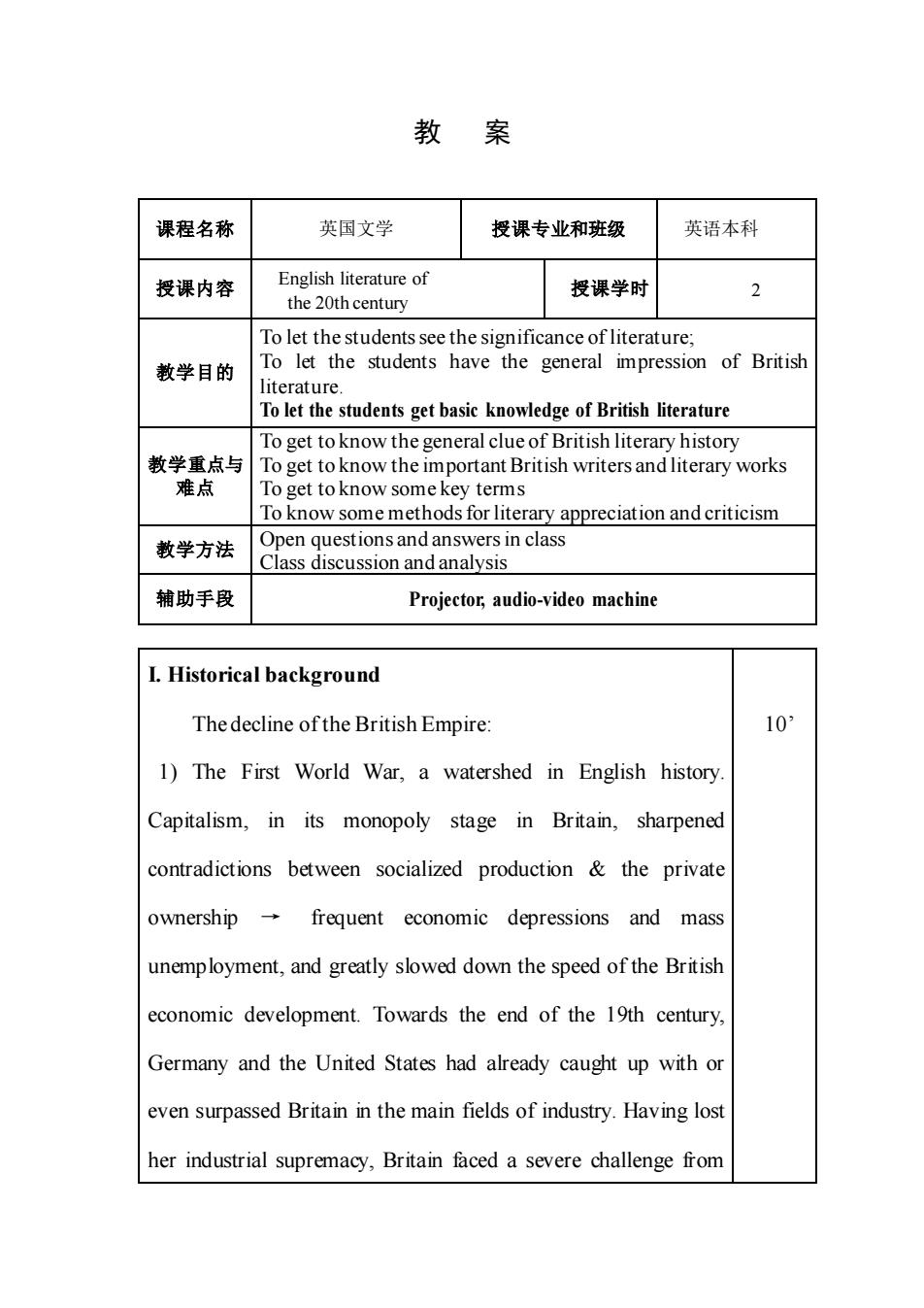
教案 课程名称 英国文学 授课专业和班级 英语本科 授课内容 English literature of 授课学时 the20thcentury To let the students see the significance of literature. 教学目的 To let the students have the general impression of British literature. To let the students get basic knowledge of British literature To get to know the general clue of British literary history 教学重点与To get to know the important British writers and literary works 难点 To get to know some key terms To know some methods for literary appreciation and criticism 教学方法 82emmnsnds 辅助手段 Projector,audio-video machine I.Historical background The decline ofthe British Empire: 10 1)The First World War,a watershed in English history Capitalism,in its monopoly stage in Britain,sharpened contradictions between socialized production the private ownership-frequent economic depressions and mass unemployment,and greatly slowed down the speed of the British economic development.Towards the end of the 19th century. Germany and the United States had already caught up with or even surpassed Britain in the main fields of industry.Having lost her industrial supremacy,Britain faced a severe challenge from
教 案 课程名称 英国文学 授课专业和班级 英语本科 授课内容 English literature of the 20th century 授课学时 2 教学目的 To let the students see the significance of literature; To let the students have the general impression of British literature. To let the students get basic knowledge of British literature 教学重点与 难点 To get to know the general clue of British literary history To get to know the important British writers and literary works To get to know some key terms To know some methods for literary appreciation and criticism 教学方法 Open questions and answers in class Class discussion and analysis 辅助手段 Projector, audio-video machine I. Historical background The decline of the British Empire: 1) The First World War, a watershed in English history. Capitalism, in its monopoly stage in Britain, sharpened contradictions between socialized production & the private ownership → frequent economic depressions and mass unemployment, and greatly slowed down the speed of the British economic development. Towards the end of the 19th century, Germany and the United States had already caught up with or even surpassed Britain in the main fields of industry. Having lost her industrial supremacy, Britain faced a severe challenge from 10’
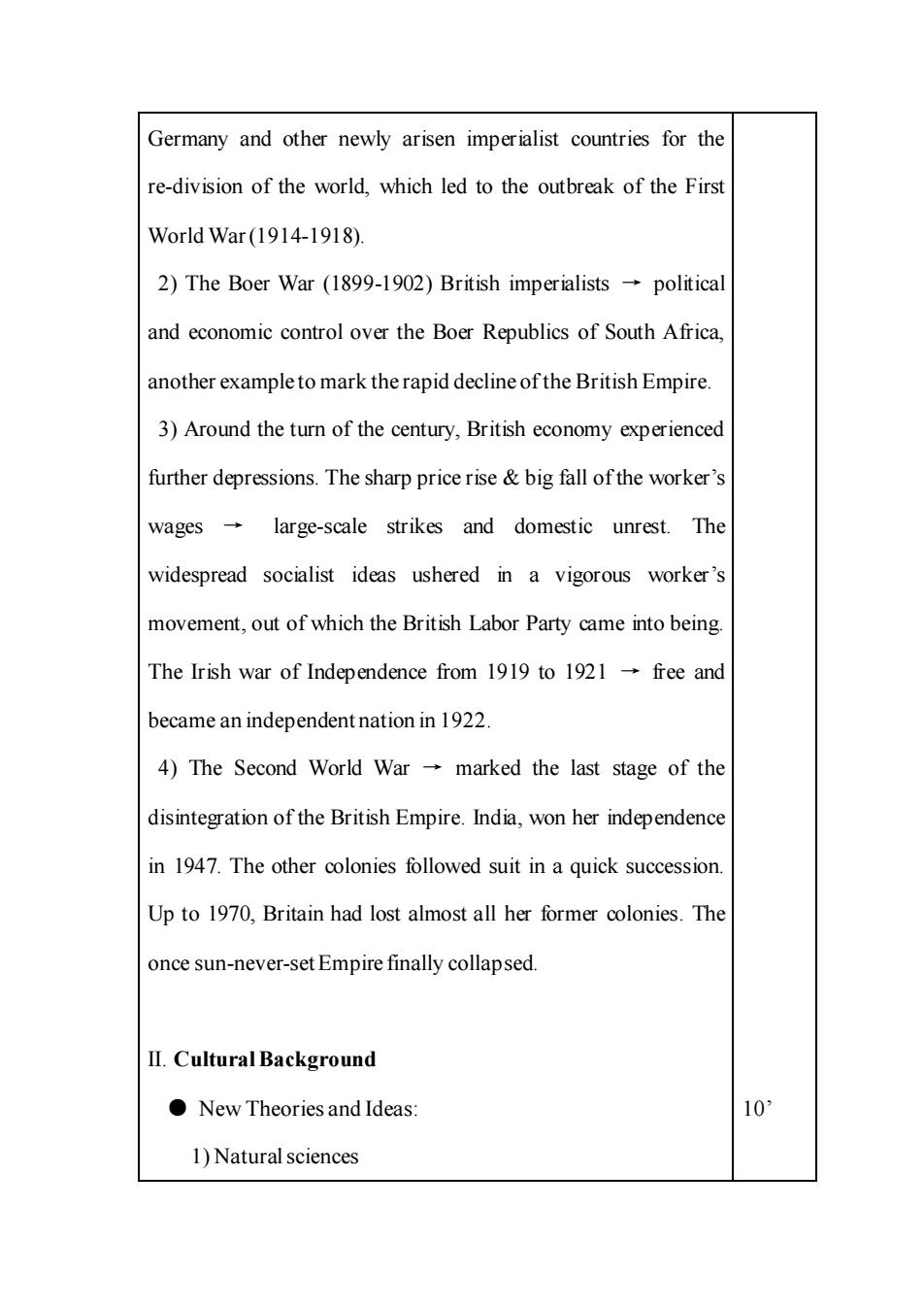
Germany and other newly arisen imperialist countries for the re-division of the world,which led to the outbreak of the First World War(1914-1918). 2)The Boer War(1899-1902)British imperialistspolitical and economic control over the Boer Republics of South Africa, another example to mark the rapid decline ofthe British Empire. 3)Around the turn of the century,British economy experienced further depressions.The sharp price rise big fall of the worker's wageslarge-scale strikes and domestic unrest.The widespread socialist ideas ushered in a vigorous worker's movement,out of which the British Labor Party came into being. The Irish war of Independence from 1919 to 1921-free and became an independent nation in 1922. 4)The Second World War-marked the last stage of the disintegration of the British Empire.India,won her independence in 1947.The other colonies followed suit in a quick succession. Up to 1970,Britain had lost almost all her former colonies.The once sun-never-set Empire finally collapsed. II.Cultural Background New Theories and Ideas: 10 1)Natural sciences
Germany and other newly arisen imperialist countries for the re-division of the world, which led to the outbreak of the First World War (1914-1918). 2) The Boer War (1899-1902) British imperialists → political and economic control over the Boer Republics of South Africa, another example to mark the rapid decline of the British Empire. 3) Around the turn of the century, British economy experienced further depressions. The sharp price rise & big fall of the worker’s wages → large-scale strikes and domestic unrest. The widespread socialist ideas ushered in a vigorous worker’s movement, out of which the British Labor Party came into being. The Irish war of Independence from 1919 to 1921 → free and became an independent nation in 1922. 4) The Second World War → marked the last stage of the disintegration of the British Empire. India, won her independence in 1947. The other colonies followed suit in a quick succession. Up to 1970, Britain had lost almost all her former colonies. The once sun-never-set Empire finally collapsed. II. Cultural Background ● New Theories and Ideas: 1) Natural sciences 10’
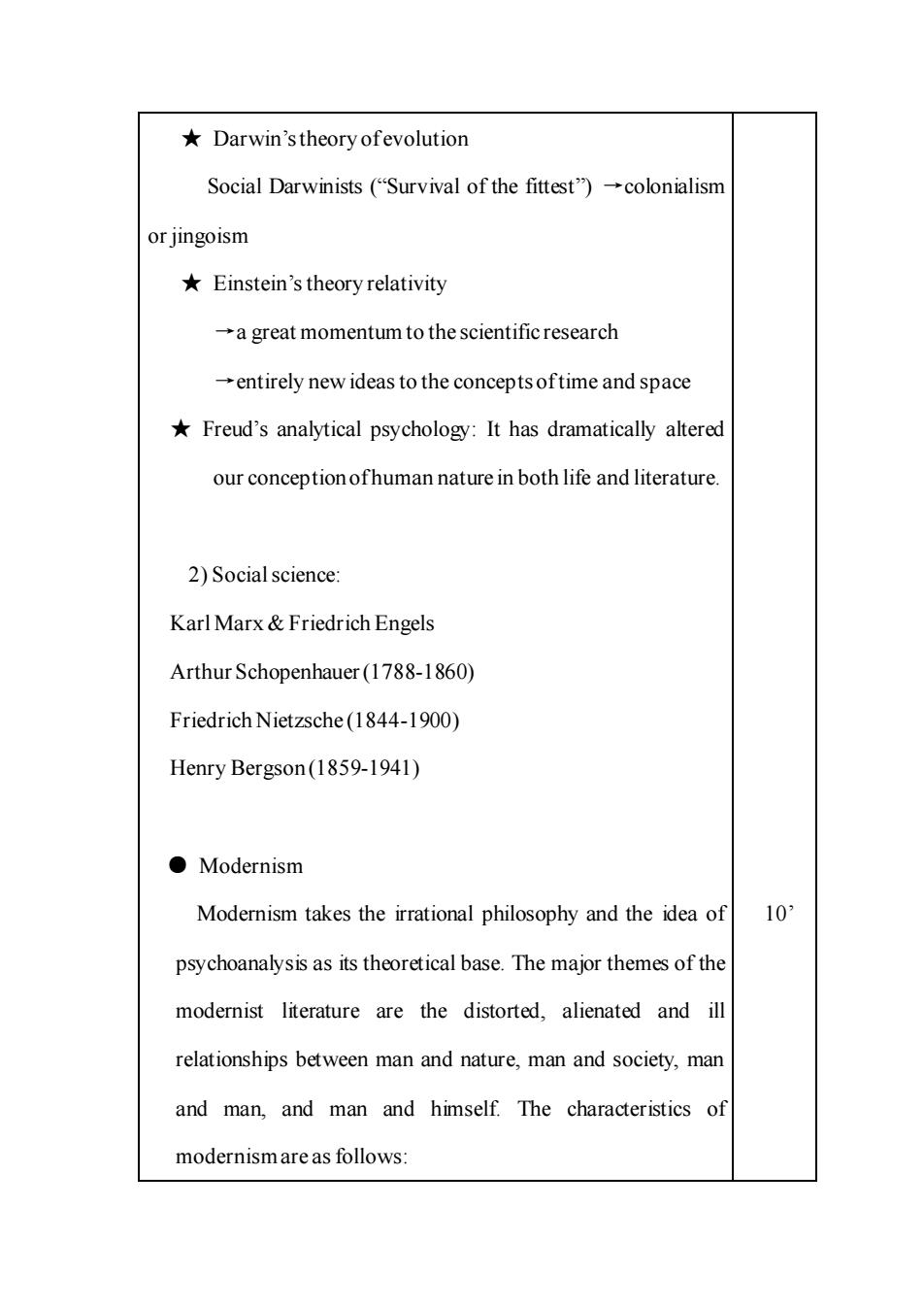
*Darwin'stheory ofevolution Social Darwinists("Survival of the fittest")colonialism or jingoism Einstein's theory relativity -a great momentum to the scientific research -entirely new ideas to the concepts oftime and space *Freud's analytical psychology:It has dramatically altered our conception ofhuman nature in both life and literature. 2)Social science: Karl Marx Friedrich Engels Arthur Schopenhauer(1788-1860) Friedrich Nietzsche(1844-1900) Henry Bergson(1859-1941) ●Modernism Modernism takes the irrational philosophy and the idea of l0: psychoanalysis as its theoretical base.The major themes of the modernist literature are the distorted,alienated and ill relationships between man and nature,man and society,man and man,and man and himself.The characteristics of modernismare as follows:
★ Darwin’s theory of evolution Social Darwinists (“Survival of the fittest”) →colonialism or jingoism ★ Einstein’stheory relativity →a great momentum to the scientific research →entirely new ideas to the concepts of time and space ★ Freud’s analytical psychology: It has dramatically altered our conception of human nature in both life and literature. 2) Social science: Karl Marx & Friedrich Engels Arthur Schopenhauer (1788-1860) Friedrich Nietzsche (1844-1900) Henry Bergson (1859-1941) ● Modernism Modernism takes the irrational philosophy and the idea of psychoanalysis as its theoretical base. The major themes of the modernist literature are the distorted, alienated and ill relationships between man and nature, man and society, man and man, and man and himself. The characteristics of modernism are as follows: 10’
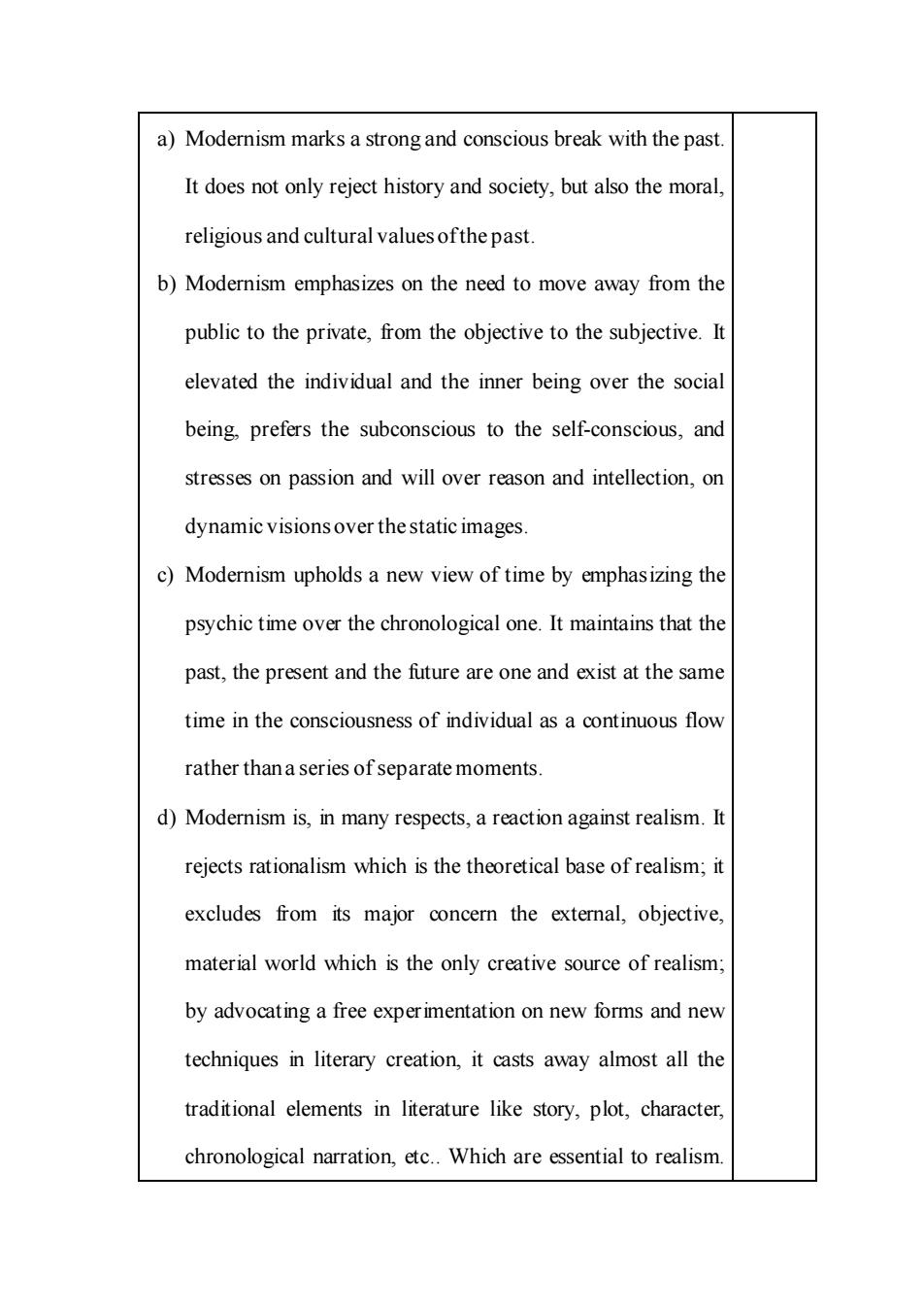
a)Modernism marks a strong and conscious break with the past It does not only reject history and society,but also the moral. religious and cultural values ofthe past. b)Modernism emphasizes on the need to move away from the public to the private,from the objective to the subjective.It elevated the individual and the inner being over the social being,prefers the subconscious to the self-conscious,and stresses on passion and will over reason and intellection,on dynamic visionsover thestatic images c)Modernism upholds a new view of time by emphasizing the psychic time over the chronological one.It maintains that the past,the present and the future are one and exist at the same time in the consciousness of individual as a continuous flow rather thana series of separate moments. d)Modernism is,in many respects,a reaction against realism.It rejects rationalism which is the theoretical base of realism;it excludes from its major concern the external,objective material world which is the only creative source of realism; by advocating a free experimentation on new forms and new techniques in literary creation,it casts away almost all the traditional elements in literature like story,plot,character, chronological narration,etc.Which are essential to realism
a) Modernism marks a strong and conscious break with the past. It does not only reject history and society, but also the moral, religious and cultural values of the past. b) Modernism emphasizes on the need to move away from the public to the private, from the objective to the subjective. It elevated the individual and the inner being over the social being, prefers the subconscious to the self-conscious, and stresses on passion and will over reason and intellection, on dynamic visions over the static images. c) Modernism upholds a new view of time by emphasizing the psychic time over the chronological one. It maintains that the past, the present and the future are one and exist at the same time in the consciousness of individual as a continuous flow rather than a series of separatemoments. d) Modernism is, in many respects, a reaction against realism. It rejects rationalism which is the theoretical base of realism; it excludes from its major concern the external, objective, material world which is the only creative source of realism; by advocating a free experimentation on new forms and new techniques in literary creation, it casts away almost all the traditional elements in literature like story, plot, character, chronological narration, etc. Which are essential to realism
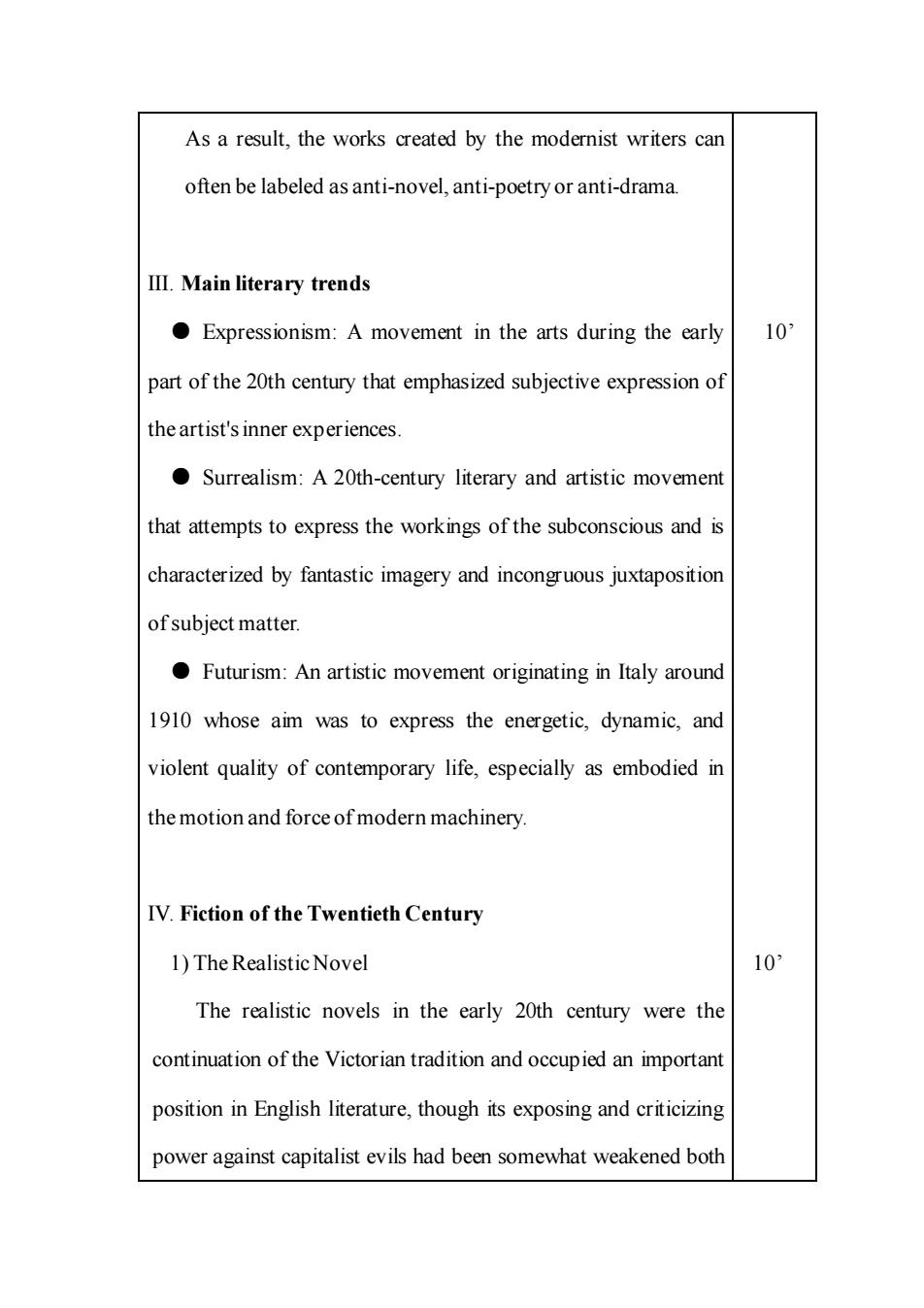
As a result,the works created by the modernist writers can often be labeled as anti-novel,anti-poetry or anti-drama. III.Main literary trends Expressionism:A movement in the arts during the early 10 part of the 20th century that emphasized subjective expression of the artist's inner experiences. Surrealism:A 20th-century literary and artistic movement that attempts to express the workings of the subconscious and is characterized by fantastic imagery and incongruous juxtaposition of subject matter. Futurism:An artistic movement originating in Italy around 1910 whose aim was to express the energetic,dynamic,and violent quality of contemporary life,especially as embodied in the motion and force of modern machinery. IV.Fiction of the Twentieth Century 1)The Realistic Novel 10 The realistic novels in the early 20th century were the continuation of the Victorian tradition and occupied an important position in English literature,though its exposing and criticizing power against capitalist evils had been somewhat weakened both
As a result, the works created by the modernist writers can often be labeled as anti-novel, anti-poetry or anti-drama. III. Main literary trends ● Expressionism: A movement in the arts during the early part of the 20th century that emphasized subjective expression of the artist's inner experiences. ● Surrealism: A 20th-century literary and artistic movement that attempts to express the workings of the subconscious and is characterized by fantastic imagery and incongruous juxtaposition of subject matter. ● Futurism: An artistic movement originating in Italy around 1910 whose aim was to express the energetic, dynamic, and violent quality of contemporary life, especially as embodied in the motion and force of modern machinery. IV. Fiction of the Twentieth Century 1) The Realistic Novel The realistic novels in the early 20th century were the continuation of the Victorian tradition and occupied an important position in English literature, though its exposing and criticizing power against capitalist evils had been somewhat weakened both 10’ 10’